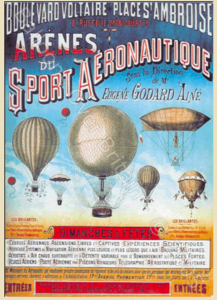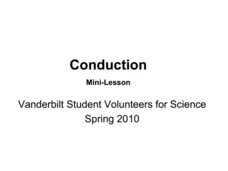Cornell University
Catapults
Ready, aim, fire! Launch to a new level of understanding as scholars build and test their own catapults. Learners explore lever design and how adjusting the fulcrum changes the outcome.
Science Geek
Gas Laws
A physical science presentation begins with an explanation of ideal gases and their behavior. Then it introduces all of the gas laws with descriptions and formulas.
Cornell University
Catapult
Studying levers couldn't be more exciting! Learners build their own catapults and test the results as they make adjustments to the fulcrum. They compete against other groups to create the most accurate apparatus.
DiscoverE
Kicking Machine
Don't kick the resource to the curb; you'll definitely regret it. Future engineers devise a kicking machine that launches a ping-pong ball toward a target. They can use a pendulum, a rubber band, or both, depending on whether they want...
DiscoverE
Build a Roller Coaster
Let the good times roll as young thrill seekers build a roller coaster on school grounds. Future engineers design and build a roller coaster from flexible tubing. The roller coaster is for a marble, so there will be plenty of room to let...
Columbus City Schools
What’s Up with Matter?
Take a "conservative" approach to planning your next unit on mass and matter! What better way to answer "But where did the gas go?" than with a lab designed to promote good report writing, research skills, and detailed observation. The...
CK-12 Foundation
Malt Shop
How does the soda clerk know exactly how to get the glass across the counter to the customer? Pupils use the simulation to adjust the launch velocity, glass weight, base area, surface material, and the customer's position to answer that...
Curated OER
Energeia -- Kinetic & Potential Energy Investigation
Students compare and contrast kinetic and potential energy. They complete demonstrations of each and test the effect of varying mass and height on each type of energy. They complete a worksheet to end the lesson.
Rice University
College Physics for AP® Courses
Take a look at an organized physics course. The 34-section electronic textbook covers material in AP® Physics 1 and 2. Teachers use the text to supplement lectures and have the class work through the labs. Each section contains multiple...
Virginia Department of Education
The Particle Theory of Matter
Demonstrate the particle theory of matter to high school scientists with an engaging experiment that allows them to visually see the results as substances change from one state to another. The class concludes with a discussion about how...
Curated OER
Domino Effect
Seventh graders investigate a change from potential energy to kinetic energy and discuss the concept of waves carrying energy. They, in pairs, work on an experiment which is guided by a worksheet imbedded in this plan.
Curated OER
Falling Water
Students drop water from different heights to demonstrate the conversion of water's potential energy to kinetic energy. They see how varying the height from which water is dropped affects the splash size. In seeing how falling water can...
Curated OER
Ball Bearing Roller Coasters and Teamwork Lab
Learners discuss potential and kinetic energy and design roller coasters to study this concept. In this energy lesson, students discuss the potential and kinetic energy of a roller coaster. Learners design roller coasters and hypothesize...
Curated OER
Building a Roller Coaster
High schoolers describe the law of conservation of energy. They identify the conversion between potential and kinetic energy. They investigate and describe the application of Newton's Laws of Motion.
Curated OER
Acceleration, Drag, Gravity, Motion, Forces, and Friction
Eighth graders build and run mousetrap cars in order to measure distance, time, and mass for their cars. They use these measurements to calculate average speed and kinetic energy, then create a slide show to visually explain how the car...
Curated OER
Heat Unit
Students define thermal equilibrium. They distinguish between internal energy and heat. Students describe how the quantity of heat that enters or leaves a substance is measured.
Curated OER
Human Activity and the Environment 2004
Students brainstorm the ways we use energy sources in our daily lives and what our lives would be like without it. They answer questions based on sections from the Human Activity and the Environment 2004, "Energy in Canada" article.
Curated OER
Cosmic Rays
Students study cosmic rays and the energy behind them. For this atmospheric lesson students complete a cosmic ray telescope project.
Curated OER
Ramp and Review
Students participate in an activity in which they observe a ball as it rolls down an incline into a cup. They take measurements and use equations that describe the concepts of mechanical energy, work and power, momentum, and friction. ...
Curated OER
The Ultimate Roller Coaster Contest
Students explain how conservation of energy applies to roller coasters. In this physics instructional activity, students construct their own coasters according to a specified criteria. They make modifications to their design when...
Curated OER
Heat and Conduction
This simple activity is ideal for upper elementary learners when studying physical science. Using their sense of touch to describe how hot something feels, and then comparing their observations to thermometer measurements, they discover...
It's About Time
States of Matter: Solid, Liquid, and Gas
Solid, liquid, and gas: they all matter. Scholars create an animation of the various states of matter, experiment with the temperature of water as it changes states, and observe carbon dioxide as it changes states. The lesson also...
Pingry School
Kinetics of the Acid Decomposition of Thiosulfate
Several factors affect the rate of a chemical reaction including temperature, surface area, and concentration. Using an experimental approach, learners explore the effect concentration has on this rate while maintaining consistency with...
Cornell University
Friction
Friction and gravity are always at odds! Learners complete a set of activities to explore the relationship between friction and gravity. Groups make conclusions about the factors that affect the amount and type of friction between surfaces.
Other popular searches
- Potential and Kinetic Energy
- Potential Kinetic Energy
- Potential & Kinetic Energy
- Kinetic Energy Questions
- Thermal and Kinetic Energy
- Kinetic Energy Lesson Plans
- Kinetic Energy of Particles
- Kinetic Energy Problems
- Science Kinetic Energy
- Potentail and Kinetic Energy
- Kinetic Energy Experiment
- Pot Entail and Kinetic Energy

























